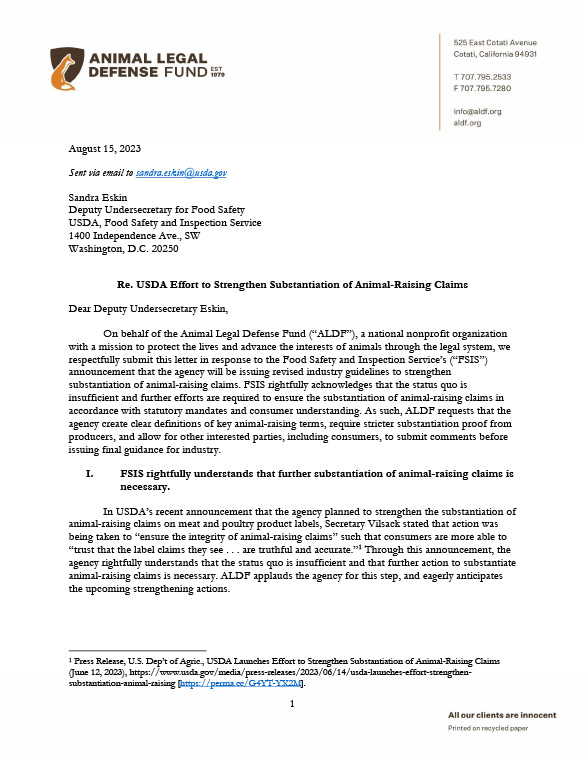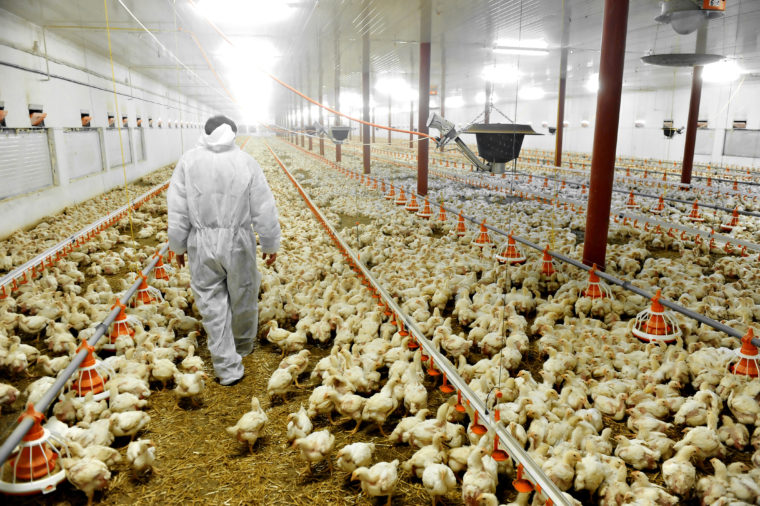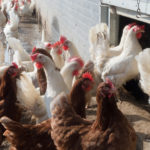
Urging FSIS to Adequately Strengthen Substantiation of Animal-Raising Claims
Submitted comments in response to FSIS announcement
Status
Next Step
FSIS will issue revised industry guidelines
On August 15, 2023, the Animal Legal Defense Fund submitted comments to the U.S. Food Safety and Inspection Service (FSIS) urging the agency to create clear definitions of key animal-raising terms, require stricter substantiation proof from producers, and allow for other interested parties, including consumers, to submit comments before issuing revised industry guidelines to strengthen substantiation of animal-raising claims.
As things stand today, FSIS does little to substantiate animal-raising claims on meat product labels. As a 2023 report by the Animal Welfare Institute demonstrated, 85% of reviewed labels lacked sufficient substantiation — including several applications provided to the agency with no substantiation at all. The current guidance also allows producers to self-define key terms such as “humane,” “sustainable,” or “raised with care.” This patchwork of definitions conflicts with many consumers’ understanding of animal-raising and care terms, creating consumer confusion as to what these terms mean on any given product label. Current agency guidance also allows for the broad use of third-party certification of animal-raising claims. Yet some of these third-party certifiers, each of which also has its own varying definition of terms such as “humane,” represent industry interests and merely rubber-stamp standard industry practices.

The comments note that FSIS should clearly define animal-raising and care claims to reduce consumer confusion and to ensure consistent, rigorous substantiation of such claims on meat product labels. This should include animal-raising claims such as “sustainably raised” and “humanely raised,” as well as animal care and living-condition claims such as “cage free,” “pasture raised,” and “not confined.” As FSIS has not defined any of these terms, producers are required to explain their definition on the label itself. However, the Animal Legal Defense Fund has found examples of labels that do not explain these terms and merely state that the production method meets the producer’s definition of humane raising, without explanation of what that means or how the animals were cared for. This lack of clarity and variety of self-definitions generates consumer confusion.
The Federal Meat Inspection Act and Poultry Products Inspection Act task FSIS with regulating meat and poultry product labels. Under both these statutes, the agency must prevent misleading labeling. To further this statutory obligation, the agency should create uniform, clear, and transparent definitions of animal-raising terms. For example, this could involve the agency defining “free range” to mean that birds actually spend time on pasture to peck, forage, or move freely on grass. Such a definition would be supported by consumer understanding — as research has demonstrated that consumers understand “free range” to mean that birds forage freely on open pastures.

Consumers care about animal-raising claims and should be able to provide input to FSIS before final guidance for industry is issued. The last time FSIS updated the animal-raising claims guideline, in 2019, the agency issued the final guideline before allowing interested parties to comment. That timeline did not permit stakeholders to voice their opinion to the agency until after a guidance document was already issued. As the 2019 guidance demonstrates, this guideline might be in effect for several years before subsequent comments are addressed or incorporated by the agency. FSIS appears to be repeating this process in issuing updated guidance for industry. Instead, the agency should allow stakeholders to voice any concerns or comments before issuing updated guidance.
What action has been taken? The comments were submitted to FSIS urging the agency to create clear definitions of key animal-raising terms, require stricter substantiation proof from producers, and allow for other interested parties, including consumers, to submit comments before issuing revised industry guidelines to strengthen substantiation of animal-raising claims.
Why this proposed rule is important: Consumers care about animal welfare. As Secretary Vilsack has acknowledged, “[c]onsumers should be able to trust that the label claims they see on products…are truthful and accurate.” FSIS rightfully acknowledges that the status quo is insufficient and further efforts are required to ensure the substantiation of animal-raising claims in accordance with statutory mandates and consumer understanding.
Sign Up!
Join the Animal Legal Defense Fund's email list to stay up to date on lawsuits, legislation, and regulations affecting animals.

